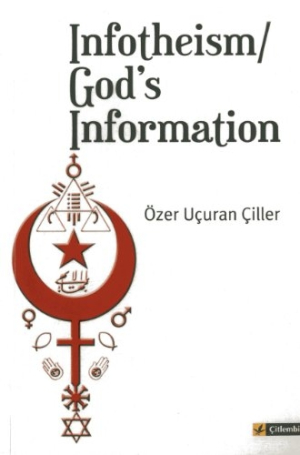It looks like you've stumbled upon a page meant to be read by our code instead of viewed directly. You're probably looking for this page.
Infotheism/God's Information
Strengthening the Dialogue Between Religions
God really can be found in the details, literally, according to Özer Uçuran Çiller in this well-reasoned book.
Özer Uçuran Çiller’s Infotheism eloquently expresses his belief that God exists and that we can discern his existence through a scientific understanding of the information contained within the basic building blocks of creation: information and energy.
In coining the term “infotheism,” Çiller, a Turkish Muslim author, scholar, business executive, and entrepreneur, has described a faith in which scientific knowledge can lead to an understanding and acceptance of the belief in a creator God who gives evidence of himself in the subatomic particles that have carried his information since the beginning of existence. Çiller declares that science denying the existence of God is a weakness, since the “absence of proof is not proof of nonexistence.”
“We cannot claim that sounds beyond certain frequencies do not exist, even though we cannot perceive or hear them,” Çiller writes, adding that “if we believe in laws, then shouldn’t we believe also in the existence of an entity that introduced those laws?” This weakness, he says, is shared by atheism, which, according to Çiller, relies on the belief that evolution is the result of a series of “coincidences,” rather than of organized and intelligent action.
Infotheism is convincing in its discussion of the ways in which “the appearance of the universe can very well be determined through God’s universal laws.” The author makes ample use of his background in philosophy and metaphysics to support his faith and especially draws upon the work of the theosophists, who believe, as Çiller does, that “everything is thought, and every thought is information.” He is also in agreement with the work of John Archibald Wheeler, American physicist and pioneer of the theory of information, whom he quotes as saying that “it is ‘information,’ rather than atoms and quarks, that is the main principle of the universe.”
Translator Adnan Tonguç has done an admirable job of making this work accessible to English-speaking readers; while discussions of a scientific and philosophical nature may make for heavy reading, the language in this book flows well and errors in grammar and syntax are few. A clean and simple, yet meaningful, front and back cover design; a well-organized table of contents; an ample author biography; and a good list of sources at the end of the book add to its attractiveness and usefulness, and to the author’s credibility.
Çiller’s book offers the hopeful thesis that belief in a creator God on the evidence presented by science—rather than on the traditions of tribal groups, religions, and distinct cultures—may enable the Abrahamic faiths to discover the ledger is more heavily weighted by what they have in common than by what separates them.
Reviewed by
Kristine Morris
Disclosure: This article is not an endorsement, but a review. The publisher of this book provided free copies of the book and paid a small fee to have their book reviewed by a professional reviewer. Foreword Reviews and Clarion Reviews make no guarantee that the publisher will receive a positive review. Foreword Magazine, Inc. is disclosing this in accordance with the Federal Trade Commission’s 16 CFR, Part 255.
